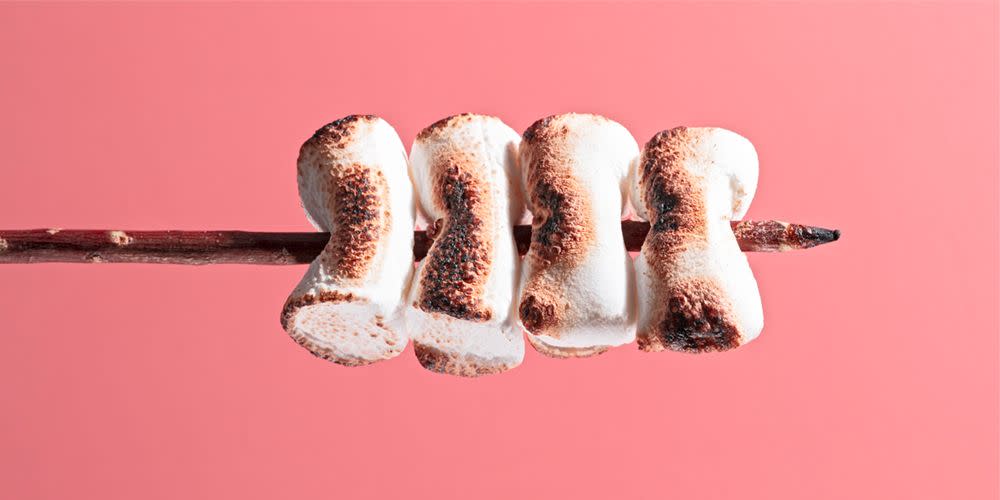There Are So Many Ways To Whiten Your Teeth, And Yet Only One Safe Way To Do It


Grooming is a world filled with jargon, technicalities and insider knowledge – some of it true, a lot of it bluster. That's where the Grooming Glossary comes in: a brand new series that drops the science on the world of skincare and haircare so you can self-care better – and with the know-how to separate the wheat from the chai-infused anti-aging miracle potion. This week, debunking the little white lies of teeth whitening.
Since the dawn of time, whiter teeth have implied fuller bank accounts. Take those marshmallow mouthed dandies trotted around Victorian London, all of them safe in the knowledge that they could afford powdered cuttlefish to keep their smiles intact (not that anyone did much smiling back then). And as for the ragamuffins scraping together an existence in Whitechapel? To the workhouse with you, Coco Pops! Some 5,000 years earlier, the Ancient Egyptians were at it too with a combination of crushed rock salt, mint and iris flowers. Pharaoh's club only, mind.
Luckily, the masses can afford a bit of Colgate these days. But the desire for whiter, brighter teeth gleams on, fuelled by Hollywood and other handsome people on Instagram – a place in which DIY teeth whitening kits, like whey proteins and crushed velour headboards, are now part of the furniture.
Don't buy into it, says Dr Ahmed Hussain, aesthetic dentist and principle practitioner at Harrow On The Hill Dental Practice. "Your social media feeds may show you that it's possible to purchase peroxide-based products to bleach your teeth, but I strongly urge you not to give into the temptation. Most of these products won't make a lasting difference, and they can cause damage to the gums and leave your teeth patchy in colour if they're not administered properly." Love Islanders hawking teeth whitening kits are, of course, on the right side of the law, but they're not exactly trained to be dishing out this sort of endorsement. "It's actually illegal for anyone who isn't a dental professional to provide teeth whitening for a reason," says Hussain. "Medical professionals ensure you receive a safe dosage in a practice, or with a special, professional, approved kit to use at home."
Love my home teeth whitening kit... from @essexsmiles So easy to use! #spon
A post shared by Dominic Lever (@domlever) on Jul 21, 2017 at 1:05pm PDT
Which, coincidentally, is based around one thing and one thing only: hydrogen peroxide. As a chemical compound with a wide variety of uses (you'll find it in everything from antiseptics to rocket propellants), a diluted form can also double up as a bleaching agent – and it's the only legal option for whiter teeth in the UK. This is the stuff that's applied to a mouthguard (one personally moulded and fitted by your dentist) which is then worn intermittently during a window that can be anything from around two to four weeks. The NHS advises patients to be realistic too, noting that teeth whitening "can't make your teeth brilliant white, but it can lighten the existing colour by several shades."
Hussain's practice goes one step further in treatment. "I whiten teeth using Philips Zoom Whitening, which can lighten teeth by over six shades in just an hour in-clinic. This modern system shines a bright light that activates the gel applied onto the stained teeth, producing oxygen that can remove stains." What's more, this procedure involves an active ingredient called ACP – shorthand for amorphous calcium phosphate – that prevents sensitivity and increases the lustre of teeth.
This isn't entirely without risk. A 2014 study in The Journal of Evidence-Based Dental Practice found that teeth whitening can increase sensitivity, and trigger mild gingival irritation alongside erosion, mineral degradation and pulpal damage (that's dentist speak for inflammation of the nerves, blood vessels and connective tissue that delivers nutrients). The chance of this happening is slim, but it's still something to consider.
A post shared by Dr Ahmed Hussain (@dr.ahmedsmiles) on Oct 30, 2019 at 11:52am PDT
Hussain also encourages his patients to exercise patient: getting your pearly whites actually white takes time. "If you're planning to whiten your teeth before a special event, allow at least a month before the day itself to allow for both in-practice and at-home tooth whitening. That'll give you enough time to think about any cosmetic bonding too to complete the procedure."
And that term – cosmetic bonding – is an important one. Defined as the branch of dentistry that involves building upon the natural teeth, it's a popular choice with the Hollywood elite and teeth whitening alone does not a Hollywood smile make. In short: they're more often than not veneers. "In many cases, Hollywood smiles are actually teeth covered by porcelain veneers," says Hussain. "I would recommend teeth to only be as white as the whites of your eyes. Anymore, and it starts to look a little unnatural."
Another ballgame entirely, then. But if you want a brighter smile without having your actual teeth whittled down to Gollum-like nubs, do it through the proper channels, with a proper dentist, without the quasi-wisdom of a Love Island runner-up. Modern medicine is great, but it needs administering by a modern medical professional after all. And thankfully, in 2020, we're a step beyond ancient rock salt and powdered cuttlefish.
Like this article? Sign up to our newsletter to get more articles like this delivered straight to your inbox
Need some positivity right now? Subscribe to Esquire now for a hit of style, fitness, culture and advice from the experts
You Might Also Like


